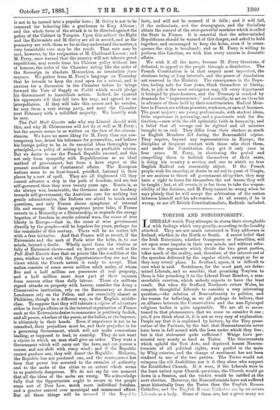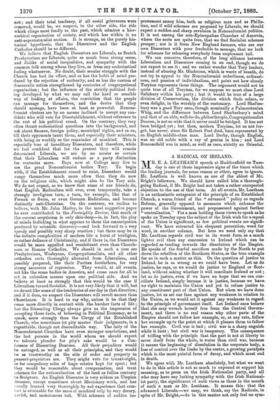TORYISM AND NONCONFORMITY.
IBERALS watch Tory attempts to storm their strongholds
with feelings which vary greatly, according to the locality attacked. They are not much interested in Tory addresses in Ireland, whether in the North or South. A secret belief that the Irish Extremists, whether Orangemen or Parnellites, will act upon some impulse in their own minds, and without refer- ence to the arguments which divide the two great parties, takes much of the reality, and, therefore, of the interest out of the speeches delivered by the regular chiefs, except so far as they may reveal plans. In Scotland, again, it is difficult to care what is said. Scotchmen, for the most part, are deter- mined Liberals, and so sensible, that preaching Toryism to them is like preaching it to the Liberal Front Benches, a com- mendable exertion, which nobody expects to have the least result. But when Sir Stafford Northcote enters Wales, he compels thoughtful Liberals to consider a very interesting question,—the relation of Nonconformity to polities, and the reason for believing, as we all perhaps do believe, that an alliance between the Conservatives and the non-Episcopal religious bodies is quite impossible. We are all so accus- tomed to that phenomenon, that we cease to consider it one ; yet, if you think about it, it is not so very easy of explanation. People say that it is explained by history, by the Tory perse- cution of the Puritans, by the fact that Nonconformists never have been in full accord with the laws under which they live ; but is that statement quite sufficient ? Whigs have per- secuted very nearly as hard as Tories. The Governments which upheld the Test Acts, and deprived honest Noncon- formists of all political rights, were guided in the main by Whig coteries, and the change of sentiment has not been confined to one of the two parties. The Tories would not reimpose the old disabilities, nor is it they alone who support the Established Church. If it were, if the Liberals were in the least united upon Church questions, the. Church would go down in a Session, and the verdict would be ratified at the next election. Moreover, the Nonconformists have not suffered more historically from the Tories than the English Roman Catholics, and the English R9rnan Cathol:cr are by no means Liberals as a body. Some of them are, but a great many are not ; and their total tendency, if all social grievances were removed, would be, we suspect, to the other side, the side which clings most fondly to the past, which admires a hier- archical organisation of society, and which has within it no anti-supernaturalist section. It is strange, on the purely his- torical hypothesis, that the Dissenters and the English Catholics should be so different.
We believe that English Dissenters are Liberals, as Scotch Presbyterians are Liberals, quite as much from strong sense, and dislike of social inequalities, and sympathy with the common folk among whom they live, as from any ecclesiastical feeling whatsoever. No doubt, their secular struggle with the Church has had its effect, and so has the habit of mind pro- duced by the rejection of authority, and so has the custom of democratic action strengthened by centuries of congregational organisation ; but the influence of the strictly political feel- ing developed by what we may call the hard or sensible way of looking at affairs, the conviction that the people can manage for themselves, and the desire that they should manage, have been at least as powerful. Noncon- formist electors are by no means inclined to accept any can- didate who will vote for Disestablishment, without reference to the rest of his political creed. On the contrary, they very often thrust ecclesiastical questions into the background, and ask about finance, foreign policy, municipal rights, and so on, till their opponents taunt them, and especially their ministers, with being as worldly as the remainder of mankind. This is especially true of hereditary Dissenters, and therefore, while we feel confident that for the present they will remain determined Liberals, we are by no means so certain that their Liberalism will endure as a party distinction for centuries more. Boys now at College may live to see the great Nonconformist bodies Tory. To begin with, if the Establishment ceased to exist, Dissenters would range themselves much more often than they do now on the religious side, which might also be the Tory side. We do not expect, as we know that some of our friends do, that English Radicalism will ever, even temporarily, take a strongly irreligious turn, a turn, for example, like that of French or Swiss, or even German Radicalism, and become distinctly anti-Christian. On the contrary, we incline to believe, with Mr. John Morley, in the most suggestive paper he ever contributed to the Fortnightly Review, that much of the current scepticism is only skin-deep—is, in fact, the play of minds frolicking in what appears to them the emancipation produced by scientific discovery—and look forward to a very speedy and possibly very sharp reaction ; but there may be in the infinite complexities of modern life a burst of irreligion, or rather defiance of Christianity, and if there is, the Dissenters would. be more appalled and recalcitrant even than Church- men or Roman Catholics. We should in such a case see Presbyterians, Wesleyans, Congregationalists, and all other orthodox sects thoroughly alienated from Liberalism, and possibly prepared, like their Puritan forefathers, for very strong measures of repression. They would, at all events, act like the same bodies in America, and cease once for all to act in unbroken masses upon one political side. And we believe at least as strongly that this would be the case if Liberalism turned Socialist. It is not very likely that it will, but we do not like some of the tendencies of our day in that direction; and if it does, we suspect the Dissenters will revolt sooner than Churchmen. It is hard to say why, unless it be that they come more directly in contact with the harsher facts of life ;. but the Dissenting Clergy always give us the impression of accepting those facts, of believing in Political Economy, so to speak, more strongly than the Clergy of the Established Church, who sometimes let pity master their judgments, in a regrettable, though not discreditable way. The laity of the Nonconformist Churches have even stronger convictions, and the last persons in the world whom we should expect to. tolerate plunder for pity's sake would be a Con- ference of Dissenting Deacons. All their prejudices would be outraged, as well as all their principles, and they would be as trustworthy on the side of order and property as peasant-proprietors are. They might vote for tenant-right, or for compulsory sales of huge estates kept for sport ; but they would be reasonable about compensation, and treat schemes for the nationalisation of the land as follies contrary to Scripture. An English Dissenter is very seldom an Utopian dreamer, except sometimes about Missionary work, and has usually learned very thoroughly by sad experience that com- fort is attainable for the mass of mankind only by very dreary, sordid, and monotonous toil. Wild schemes of sudden im- provement annoy him, both as religions man and as Philis- tine, and if wild schemes are proposed by Liberals, we should expect a sudden and sharp revulsion in Nonconformist politics. It is not among the non-Episcopalian Churches of Amercia, where the sects are quite free, that we find Socialist schemes prosper ; nor is it from New England farmers, who are our own Dissenters with poor freeholds to manage, that we look for schemes for releasing everybody from unpleasant toil. We can conceive, therefore, of the long alliance between Liberalism and Dissenters coming to an end, though we do not expect to see it ; and we rather wonder that Tory leaders, instead of abusing Mr. Gladstone, which is waste of breath, do not try to appeal to the Nonconformist orderliness, ordinari- ness, and passion of individualism, and point out how closely Toryism represents these things. The argument would not be quite true of all Toryism, for we suppose we must class Lord Salisbury within his party ; but it would be true of a large division of Conservatism, the division which finds solace, or even delight, in the worship of the customary. Lord Shaftes- bury was a good Tory once, though nominally a Palmerstonian Whig, and the difference between Lord Shaftesbury's mind and that of an able, well-to-do, philanthropic, Congregationalist Deacon, is not so wide that it never could be bridged. It has not been bridged yet ; but then, modern Toryism, let us not for- get, has never, since Sir Robert Peel died, been represented by an English middle-class man. Lord Derby, though English, was an old noble with a ray of genius in him ; and Lord Beaconsfield was in mind, as well as race, strictly an Oriental.



































 Previous page
Previous page